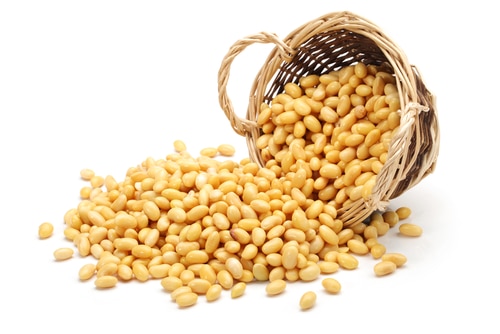
What is an Anti-Nutrient?
An anti-nutrient is any compound that reduces your body’s ability to absorb nutrients from your diet. They’re found naturally in the foods you eat, even healthy foods like vegetables. Fortunately, anti-nutrients will rarely have a major impact on your health or nutritional status unless you consume a large number of them, but there are ways to reduce their impact on your health. That’s important since certain people may be more sensitive to the effects of anti-nutrients.
Types of Anti-Nutrients – Phytates
Some of the most common anti-nutrients in foods are phytates. Phytates are compounds in plants that allow them to store phosphorus. Phytates are most commonly found in whole grains, particularly wheat bran, and in legumes, nuts, and seeds. Even though phytates have antioxidant activity, a good thing, they also block the absorption of minerals, especially iron and zinc. Plus, they bind niacin, a type of B-vitamin.
How concerned should you be about phytates in your diet? Unless you eat a large number of whole grain foods or lots of wheat bran, phytates probably won’t have a major impact on your mineral or niacin status. If you’re concerned, you can soak grains in an acidic medium like vinegar or lemon juice before eating them or cook them well. Both acid and heat destroy some of the phytates while making their more digestible.
Lectins
Lectins are a type of anti-nutrient found in high quantities in whole grains, beans, lentils, peanuts, and nightshade vegetables. They’re present to some degree in almost all plants since they serve as natural pesticides to keep insects away and animals from nibbling on them. Research suggests they may bind to intestinal cells and disrupt digestion of protein and carbohydrates. There’s some thought they play a role in inflammatory bowel disease by activating an immune response that triggers inflammation. They also seem to alter gut bacteria that help keep your intestines healthy. People who lack adequate stomach acid, a significant number of older people, may be particularly susceptible to the effects of lectins.
Is there a way to reduce the impact of lectins on your health? Cooking foods high in lectins reduces their effect, so don’t eat uncooked lentils, beans or whole grains, and don’t go overboard with the number of lectin-rich foods you eat period. Dietary diversity is better anyway as long as you stick with whole foods.
Oxalates
Oxalates are another type of anti-nutrient that are most abundant in green, leafy vegetables like spinach. Other sources include black tea, beets, chocolate, buckwheat, nuts, berries, rhubarb, and beans. Oxalates block the absorption of iron and calcium by forming complexes with these minerals. Unfortunately, when oxalates bind to calcium, they’re excreted into urine. This can cause calcium oxalate stones to form in the urinary tract leading to the painful diagnosis of kidney stones.
Vitamin C can also be converted to oxalic acid. That’s why it’s not a good idea to take high doses of vitamin C in supplement form, especially if you have a history of kidney stones. Cooking foods that have oxalates only reduce their oxalate concentration by about 10%.
Other Anti-Nutrients
Soybeans contain a number of anti-nutrients including enzyme inhibitors that reduce the absorption of protein and carbohydrates. They are also a source of phytates. The best way to get the benefits of soy foods is to eat fermented soy from sources like tempeh and miso. Fermentation inactivates most of the anti-nutrients.
Cruciferous vegetables, veggies with significant health benefits, have some anti-nutrient activity. They contain compounds that reduce uptake of iodine by the thyroid. In large amounts, these “goitrogens” can reduce thyroid function. That doesn’t mean you should avoid cruciferous vegetables. They have too many positive benefits i.e. anti-cancer activity etc. Fortunately, steaming broccoli reduces much of the anti-nutrient activity.
Unfermented soy also contains goitrogens that can affect thyroid function. Stick with fermented sources of soy, and skip the unfermented, processed veggie burgers and tofu you see at the supermarket. If you have a history of thyroid disease, talk to your doctor about how much soy and other foods high in goitrogens you should eat.
The Bottom Line?
The best way to avoid the negative impact of anti-nutrients on your health is to eat a diverse diet of whole foods and cook whole grains, legumes, and cruciferous vegetables before eating them. If you enjoy soy foods, stick mainly with fermented soy like miso and tempeh. If you have a history of thyroid problems, kidney stones or autoimmune problems, talk to your doctor about your diet.
References:
World’s Healthiest Foods website
J. Agric. Food Chem 35 (6): 974. doi:10.1021/jf00078a028.
J AOAC Int 88 (3): 967–87.
Related Articles By Cathe:
What Are Phytochemicals and What Role Do They Play in Health?

